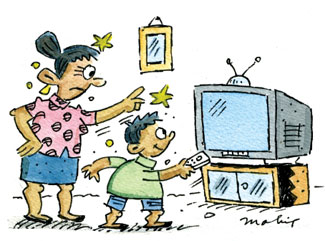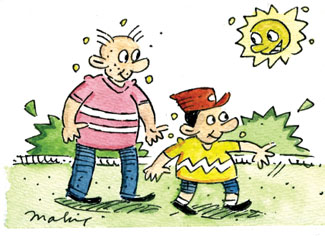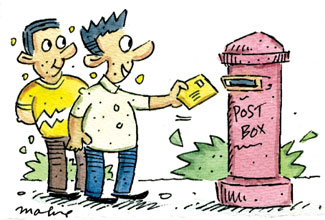|
 by R. S. Karunaratne by R. S. Karunaratne
How to place adverbs in sentences
An adverb can be just one word or a longer adverbial phrase. There
are certain rules governing the use of adverbs.
1. As a general rule, adverbs are not used between a verb and its
object.
She often goes to the library.
|

Could you switch off the TV? |
Nila speaks English well.
Prathibha is running fast.
Khema dances beautifully.
Lumumba ruled his country democratically.
However, an adverb particle (on, off, out etc.) can be used between a
verb and a noun object.
Could you switch off the TV?
Put on your shoes.
The Urban Council cut off the electricity supply for non-payment of
bills.
2. Adverbs can be used in the front position or the beginning of a
sentence.
Yesterday morning a robber broke into our flat.
Last year we visited Kataragama and Yala.
This morning we went to school on foot.
Next month my granddaughter will sit the Grade V examination.
Last month we received an annual bonus.
3. Adverbs can be used in the mid-position as well.
I completely forgot to buy a ticket.
We finally managed to get two seats in the balcony.
She casually asked where I studied.
Sugath promptly answered the question.
Lal quickly grabbed the opportunity.
4. Adverbs can be used at the end position.
What will happen tomorrow? I will be visiting India next year.
Soma started crying bitterly.
Jason delivered his speech forcefully.
Kamala acted her role beautifully.
5. Adverbs of indefinite frequency go in mid-position.
Mala often forgets to bring her umbrella.
He has definitely decided to do law.
My boss always finds fault with me.
The examination has been indefinitely postponed.
Kareena sometimes smiles with me.
|

Carefully, we stepped on the
grass. |
6. Adverbs of manner, place and time go in end position.
Shan brushes his teeth vigorously. (Manner)
Kumar sat in his seat calmly. (Manner)
The rich man gave away his wealth lavishly. (Manner) The hungry
beggar ate his meal greedily. (Manner)
Jinasena walked to school lazily. (Manner)
We used to play in the fields. (Place)
A group of workers launched a picketing campaign opposite the Town
Hall. (Place)
What is happening on the campus? (Place)
Keep the books on my table. (Place)
The couple kept on moving on the dancing floor. (Place)
What are you doing tomorrow? (Time)
Let's fix the meeting for August 8. (Time)
We will be going to London during the vacation. (Time)
Can we do some revision next week? (Time)Grandfather visited my house
yesterday.(Time)
7. Comment adverbs usually go in front position.
Foolishly, I pressed the accelerator.
Luckily, I had some money in the other bag.
Wearily, the man started climbing the hill.
Lazily, she opened the grammar book.
Carefully, we stepped on the grass.
8. Adverbs of certainty could be used at the beginning of a clause.
Maybe you're right.
Perhaps she is not coming.
Surely you know the answer.
Actually I am the owner of this house.
Really I am happy today.
9. Emphasising adverbs go directly before the words they emphasise.
I was extremely annoyed with John.
I am terribly sorry for what happened this morning.
If you can see me just before lunch, it is fine.
Your boss is really angry today.
Some people are unnecessarily excited.
Fun with proverbs
Proverbs can be defined as condensed folk wisdom. By using proverbs
you can put your thoughts across to the other person in the most
delicate manner. Be familiar with the following proverbs and use them in
your speech and writing.
1. Many hands make light work
When many people take part in a given task, it becomes easy to
perform.
2. Marriages are made in heaven
Most people believe that marriage is governed by fate. Sometimes a
man and a woman who have known each other for a long time do not get
married. However, the man may marry a woman he meets at a party.
3. Money burns a hole in your pocket
Money is a strange commodity that does not stay in your pocket for a
long time. When you have money, you want to spend it.
4. Money doesn't grow on trees
We pluck fruits from trees quite easily. However, we cannot pluck
money as they do not grow on trees. Money has to be earned the hard way.
5. Money talks
If you have money, you can get almost anything done by others. As a
result, the rich have an advantage over the poor.
6. Necessity is the mother of invention
When you need something very badly, you will find a way to get it.
Modern transport system is a classic example.
7. Never say die
Never give up hopes simply because you encounter difficulties.
8. A new broom sweeps clean
New recruits in an organisation usually work harder and better than
senior hands. They are full of enthusiasm and vigour.
9. No news is good news
People usually expect to hear bad news. When they do not hear bad
news they assume things are going on smoothly.
10. Not for all the tea in China
China is the biggest producer of tea. When you use this idiom you
mean that you are not willing to do something in exchange of any other
thing. A similar proverb is : "Not for all the coffee in Brazil."
Starters :
The simple future tense
To form the simple future tense we use "will" and "shall" + the bare
infinitive.
Affirmative
I shall / will work (First person singular)
You will work (Second person singular)
He will work (Third person singular)
We will work (First person plural)
|

I am posting this letter today so that he
will get it tomorrow. |
You will work (Second person plural)
They will work (Third person plural)
Negative
I shall / will not work
You will not work
He will not work
We will not work
You will not work
They will not work
Negative contracted
I shan't work / I won't work
You won't work
He won't work
We won't work
You won't work
They won't work
Interrogative
Shall I work?
Will you work?
Will he work?
Shall we work?
Will you work?
Will they work?
Negative interrogative
Shall I not work?
Will you not work?
Will he not work?
Shall we not work?
Will you not work?
Will they not work?
Use of "shall" and "will"
Formerly "will" was used with the first person to indicate intention or
promise.
I will meet you tomorrow.
However, "will" is more common in modern conversation.
I will be 20 next month.
"Shall" is still used in the interrogative.
Shall I come with you?
Let's go, shall we?
"Shall" is used to indicate determination.
We shall defeat terrorism.
The simple future tense is used to express the speaker's opinions, and
speculations.
I assume he will be the next prime minister.
I suppose they will win the election.
Perhaps, we will meet him on the way.
The simple future tense is used for habitual actions.
Summer will come again.
Hens will lay eggs.
Politicians will tell lies again.
Sometimes, "shall" is used to express the idea of promise.
You shall have a seat. (= I promise you a seat)
I shall be there to receive you.
The simple future tense is used in sentences containing a conditional
clause.
If you study well, you will pass the examination.
I am posting this letter today so that he will get it tomorrow.
The simple future tense is used in newspapers.
The minister will open the new library building tomorrow. |

